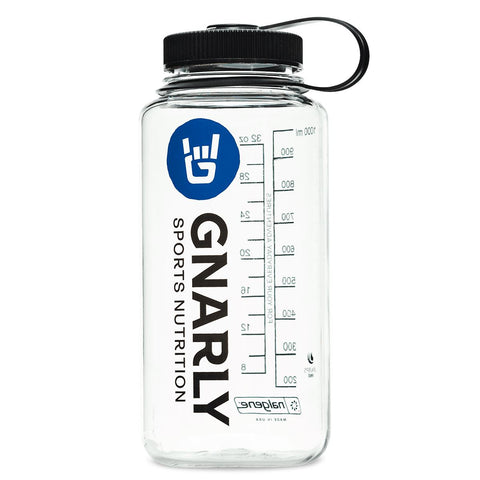Fueling while hiking is essential for maintaining energy and recovering quickly in the days that follow. However, many hikers underestimate the amount of food they really need to consume! Hiking can be incredibly energy intensive, so it’s important that if you’re regularly hiking, you have a plan to replace that lost energy. This especially holds true if you have training goals, as an energy deficit is unlikely to serve them.
If you’re feeling lethargic while hiking, you may need to consume more food, and specifically more carbohydrates! Carbohydrates ingested while hiking provide blood glucose to working muscles, while preserving glycogen stores. Glycogen is the stored form of carbohydrates, but this resource is limited. A steady supply of carbohydrates translates to more prolonged, sustainable energy.
Calorie needs while hiking
Calorie needs while hiking can vary greatly depending on your baseline needs, the weight of your pack, the trail grade, and even the terrain. As you can imagine, it’s much easier - and less energy intensive - to walk on a paved road or sidewalk than it is to walk on an uneven trail. Hiking can oftentimes require nearly double the energy needed for walking at a pace of 3mph [1].
Estimating your calorie needs while hiking will never be totally accurate given all of these variables, but you can begin with the goal to consume 300-500 calories for every hour of hiking. However, it’s okay if you can’t replace these calories every hour and instead have a higher calorie breakfast, lunch on the trail, or dinner to replace lost energy. What matters is that at the end of the day, you are not in a calorie deficit.

Carbohydrate needs while hiking
It’s important to be strategic in fueling for hiking because not only is it an energy-intensive activity, but this amount and frequency of carbohydrate recommended does not always feel intuitive while hiking. Additionally, appetite can be blunted during physical activity, in hot and humid temperatures, as well as at altitude, all of which are common occurrences for hikers. With this in mind, it’s helpful to have a cue for eating so that you don’t miss out on an important fueling opportunity! For example, you may time your hike and eat on the hour.
It’s recommended to consume 30-60g of carbohydrates every hour while hiking [2]. If you’re not used to eating this many carbohydrates, it will probably feel like a lot!
Before heading out on the trail, it can be helpful to not only have an estimate of the time it will take you to complete the trail, but to also know which of your snacks - or combination of snacks - will give you the proper amount of carbohydrates. Don’t forget to add on an extra couple hours worth of carbohydrates in case your estimate is off!
Great carbohydrate sources for hiking include: Fruit, bread, bagels, tortillas, rice cakes, dates, jam, fruit leather, honey, maple syrup, apple sauce or other high carbohydrate fruit puree, granola bars, crackers, pretzels, or carbohydrate powders such as Gnarly Fuel2O. Carbohydrate powders can be fantastic for long hiking days given their palatability, light weight, and electrolyte content.
When to consume protein, fat, and fiber
Because protein, fat, and fiber all slow digestion speed, they could contribute to digestive discomfort, such as gas, bloating, and cramping, during difficult sections of a hike, like a steep incline.
Hikers may feel best saving large amounts of these foods for sections of the hike that are less intense (e.g. level ground or a slight decline), or lunch breaks. However, it’s important not to eliminate protein, fat, and fiber completely because they all play an important role in your nutrition. Protein supports muscle protein synthesis and recovery, fat easily fills in large gaps in energy, and fiber promotes digestive health and regular, complete bowel movements. It’s acceptable to include these foods during more intense portions of hikes in amounts that are personally tolerable to you.
With this in mind, you may realize that protein bars were not on the above list of great carbohydrates for hiking! Because of their obvious high protein content, these may be best saved for breaks.

Remember to bring foods you love!
While chocolate peanut butter anything might sound good at home, it may be quite unappetizing on the trail. It takes trial and error to find foods that work for you! I recommend branching out from your usual snack picks and trying something new to accommodate your changing appetite. Additionally, bring a variety of snacks to accommodate different preferences - bring foods that are sweet, savory, and even plain. Thinking ahead and bringing a variety of snacks can make fueling regularly so much easier - you are bound to find something you want in your pack this way!
However, don’t try new foods and fueling strategies on hikes without a quick exit strategy. No one wants stomach cramps when they’re 10 miles from their car! Choose short hikes to try out new foods, and save your tried and true snacks for the long treks.
TL/DR
- The overall energy goal with hiking is to replace what you expend (and therefore avoid calorie deficits by the end of the day)
- Aim for 30-60g of carbohydrates every hour
- Limit protein, fat, and fiber during intense sections of the hike to improve digestive comfort
- Remember that your food preferences may change during physical activity, and you should bring a variety of foods to accommodate this
References
- Summerfield, L. (2016). In Nutrition, exercise, and behavior: An integrated approach to weight management (p. 380). essay, Wadsworth Cengage Learning.





